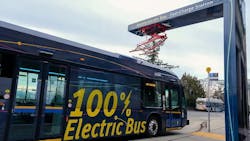TransLink to add more than 100 BEBs to its fleet
TransLink is expanding its battery-electric bus (BEB) fleet by more than 100 buses, with the approval of C$479 million (US$351 million) in funding by Metro Vancouver’s Board of Directors. The funding is through the government of Canada’s Community Building Fund.
TransLink notes the investment will improve bus service for customers by supporting long-term service growth, expanding charging capabilities and diversifying the transit fleet.
The breakdown of the investment is as follows:
- 102 new BEBs to replace aging diesel buses
- 64 additional bus chargers and upgrades at the Port Coquitlam Transit Center
- Testing a 60-foot electric trolleybus with in-motion charging capability
The agency says it currently has 19 BEBs, with 57 more Nova LFSe+ BEBs on the way, as well as 10 on-route overhead chargers. According to TransLink, the expansion would bring the number of BEBs in its fleet from 19 to 178 by 2030.
TransLink notes it continues to build new infrastructure to support future fleet electrification, including building a new transit center, upgrading an existing transit center and adding new on-route charging stations.
The agency says the 102 new BEBs will reduce TransLink’s greenhouse gas emissions by 8,200 metric tons annually and more than 140,000 metric tons over their lifespan. According to the agency, on-route charging stations can top up buses in just five minutes, enabling all day service.
TransLink operates the second largest fleet of fully electric trolley buses in North America with 262 buses. The SkyTrain is also a fully electric transit service.
“TransLink is grateful for this investment in our battery-electric bus fleet, which will allow us to improve service for our customers. We are now set up to replace aging diesel buses with a diversified fleet that will serve our customers efficiently and sustainably,” said TransLink CEO Kevin Quinn.
Metro Vancouver’s Board Chair Mike Hurley added, “We know that part of a healthy, livable region is a strong public transportation system. That’s why municipalities in this region support transportation by pooling our federal funds and prioritizing low-carbon transit solutions to help build a cleaner, more connected future for everyone in Metro Vancouver.”
